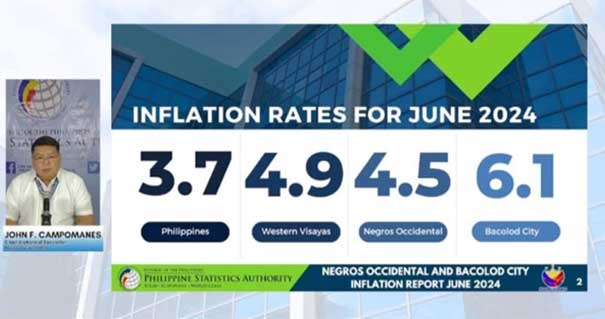
Negros Occidental, Philippines – The Philippine Statistics Authority (PSA) of Negros Occidental reported a significant rise in inflation for June 2024 during a press conference held on July 15, 2024. The event, led by PSA Negros Occidental Chief Statistical Specialist John F. Campomanes, revealed an acceleration in the inflation rate for both Negros Occidental and Bacolod City, signaling economic pressures in the region.
For Negros Occidental, the headline inflation rate for all income households rose to 4.5% in June from 4.2% in May. This marks a notable decrease from the 8.1% recorded in June 2023. Campomanes highlighted the key contributors to this inflationary trend: “Food and non-alcoholic beverages had the highest impact with a 6.6% inflation rate and a 58.9% share, followed by restaurants and accommodation services at 9.3% and housing, water, electricity, gas, and other fuels at 1.7%.”
Additionally, the inflation rate for the bottom 30% income households in Negros Occidental increased slightly to 5.2% in June from 5.0% in May. Last year, this figure stood at 8.3%. The main contributors to the June 2024 inflation for this group were housing, water, electricity, gas, and other fuels; clothing and footwear; and furnishings, household equipment, and routine household maintenance.
Bacolod City experienced an even sharper increase in inflation, with the rate for all income households climbing to 6.1% in June from 4.5% in May. In June 2023, the rate was 6.7%. For the bottom 30% income households in Bacolod, inflation rose to 6.8% in June from 5.1% in May, a decrease from 9.0% a year earlier.
Campomanes noted the primary factors driving Bacolod City’s inflation: “The top contributors were food and non-alcoholic beverages at 7.1% with a 37.9% share, housing, water, electricity, gas, and other fuels at 7.4%, and education services at 17.2%.”
Despite these inflationary pressures, some commodity groups showed a reduction in inflation rates. In Negros Occidental, lower rates were observed in food and non-alcoholic beverages, alcoholic beverages and tobacco, transport, and personal care and miscellaneous goods and services. Similarly, Bacolod City saw decreased inflation in alcoholic beverages and tobacco, furnishings, household equipment and routine household maintenance, health, transport, and personal care and miscellaneous goods and services.
The indices for health, information and communication, education services, restaurants and accommodation services, and financial services remained unchanged in Negros Occidental. In Bacolod City, unchanged indices were observed for information and communication, education services, restaurants and accommodation services, and financial services.
Campomanes emphasized the importance of monitoring these trends: “Understanding the components of inflation helps us address the needs of the most affected households and sectors. It is crucial for policy-making and for providing targeted support.”
This latest data underscores the ongoing economic challenges faced by residents of Negros Occidental and Bacolod City, prompting calls for strategic interventions to mitigate the impact of rising prices on households, particularly those with lower incomes.




















